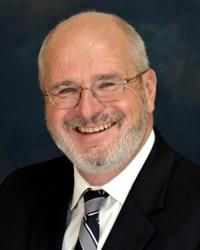Neighbor to neighbor, human to human
EVANSVILLE, Ind.—John Dunn stood in front of 240 people and fought back tears.

Dunn, a successful Evansville businessman, just had received the “Person of the Year†Award from The City-County Observer, a feisty and effective local newspaper, at the paper’s annual luncheon.
An honor such as that for many people would prompt a round of thanks. For others, it might have become an exercise in self-congratulations disguised as humility.
Dunn chose another route altogether.
That’s why he was struggling to master his emotions.
As people watched him, they applauded—to encourage him. To let him know it was okay.
When Dunn began to speak, the words came haltingly.
He said he knew it was time for the luncheon to end, but that there was something he had to do. He had done something that he considered out of character for him.
There was someone in the room, Dunn added, about whom he had said harsh things. It had been wrong for him to say such things, even in the heat of conflict, Dunn said. That was not the kind of person he wanted to be.
He wanted to be the sort of person who did the right thing.
Dunn’s gaze pivoted to his left, to a table where Vanderburgh County Superior Court Chief Judge Les Shively sat.
Some years ago, Dunn and Shively, then a lawyer and not yet a judge, were on opposite sides of a legal battle. The jousting was intense and hard-fought.
Hard feelings ensued—and lingered for months and then years.
Dunn looked at Shively’s table for a moment, still working to compose himself.
When he spoke again, every word seemed on the verge of breaking.
Dunn said he wanted to publicly apologize to Shively for the things he had said about him. As Dunn said the words, he brushed away tears.
Shively got out of his seat and walked to the stage. He, too, was crying.
The two men, warriors in who knows how many battles, embraced for a long moment, both of them weeping. The people in the crowd clapped. Many of them had tears in their eyes, too.
We live in contentious times. As fellow citizens and neighbors, we disagree about many things. Many of our arguments are bitter ones that leave both sides feeling bruised and wronged.
It becomes easy—too easy—for us to marinate in the stew of our own seething.
It takes a person of courage and character to step away from that anger, to surrender resentment, to acknowledge responsibility for wrongs done.
But it’s the right thing to do.
Because, whatever our differences—however fractious our debates might be—we are still fellow citizens and neighbors. We are fellow human beings.
That should count for something.
That’s what John Dunn understood.
I was seated at the head table when Dunn delivered his apology to Shively. They embraced right behind my chair.
I had delivered the keynote at the luncheon.
I made a decent speech. Maybe it was even a good one.
I told stories about remarkable things my students had done. I told a few jokes. People laughed.
They clapped and said nice things when I was done.
But—a week, two weeks or a year from now—no one will remember what I said.
They will remember, though, what John Dunn did. They will recall how he battled with his emotions as he willed himself to do something difficult.
The right thing.
And they will remember the two men who once clashed bitterly and ended up reconciling before a room full of people.
This is as it should be.
A speech, after all, is just a speech.
But what John Dunn did?
That’s a path forward for all of us.
FOOTNOTE:  John Krull is director of Franklin College’s Pulliam School of Journalism and publisher of TheStatehouseFile.com, a news website powered by Franklin College journalism students. The views expressed are those of the author only and should not be attributed to Franklin College






What a beautiful moment was seen by over 240 people the day of the Annual CCO Luncheon. John Dunn is a class act and I believe he taught us all a valuable lesson that day.
Forgiveness will definitely set the heart free.
Comments are closed.